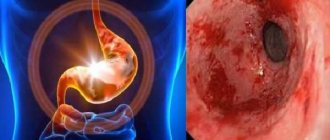Drug treatment of atrophic gastritis in adults is aimed at restoring the functions of the gastric mucosa, relieving pain and destroying the causative agent of gastritis (Helicobacter pylori bacteria). The choice of medications, as well as the course of their use, depends on the causes of the disease.
Let's figure out how to treat atrophic gastritis of the stomach.
More information about the drug
The drug is manufactured under various brand names, but it always contains the basic active ingredient - omeprazole, which belongs to the group of proton pump inhibitors. Taking Omeprazole for gastritis helps fight the inflammatory process on the mucous membrane (ulcers, erosions) and speeds up the healing process.
"Omeprazole" affects the glands themselves, the cells of the stomach walls, blocking acid synthesis. This ability explains the effectiveness of the medicine in the treatment of gastritis.
The drug is available in the form of capsules and tablets, which dissolve under the influence of gastric juice and begin to work. The drug, produced in powder form, is used in more acute cases of the disease as an injection solution.
After a single dose of the drug, there is an almost immediate decrease in the synthesis of hydrochloric acid, and the maximum level of the active substance in the blood plasma is observed 2 hours after consuming the drug. The duration of action of the drug is 24 hours. To avoid side effects from misuse and overdose, it should be taken in accordance with the instructions for use. The medicine continues to work for another week even after discontinuation.
"Omeprazole" is called an antisecretory medication that is used for gastritis with high acidity. The mechanism of its work is based on the suppression of hydrochloric acid synthesis in the stomach.
How does this drug affect the body?
Video on the topic:
Omeprazole should be taken correctly for gastritis and in the appropriate dosage, then it will have the following effects on the body:
- will relieve pain. Omeprazole itself does not have an analgesic effect, but the elimination of pain occurs due to the elimination of the irritation factor - neutralization of acid;
- normalizes stool. Reducing acidity, which often contributes to various disruptions in intestinal activity (diarrhea and constipation), eliminates unpleasant symptoms;
- will eliminate sour belching and nausea. This medicine helps to get rid of these symptoms, but for the best effect, therapy should be comprehensive and accompanied by a diet;
- will relieve heartburn. Omeprazole, by reducing the concentration of acid in the stomach, prevents its release into the esophagus.
When used correctly and complete the full course of treatment, this remedy protects for a long period from exacerbations of gastritis and heals the gastric mucosa.
Statistics
Gastritis is one of the most common diseases on Earth and the most common in the structure of diseases of the gastrointestinal tract. According to statistics, up to half of the world's population suffers from one form or another of gastritis, but not every person knows about the serious consequences of this disease. Gastritis can lead to the development of gastric and duodenal ulcers, which can lead to life-threatening complications such as gastric perforation, peritonitis, gastrointestinal bleeding, and even the development of malignant neoplasms.
Important! It is to reduce the risk of such complications that gastritis must be treated in a timely manner.
How to take the product? Dosage
The duration of the course of treatment and dosage are determined by the attending physician individually, depending on the form of the disease (the medicine is usually not prescribed for low acidity), taking into account the age and characteristics of the patient’s body.
One capsule contains the optimal daily dose of the active substance, so drinking Omeprazole for gastritis once a day is enough.
How to take the medicine correctly: before meals or after? "Omeprazole" for gastritis with high acidity is usually taken before the morning (first) meal. In addition, there are some rules for taking medication to obtain the greatest therapeutic effect:
Capsules (or tablets) should be swallowed whole; they are not recommended to be chewed or dissolved. The dissolution process must occur under the influence of gastric juice.
The duration of treatment depends on the form of the disease. For example, for acute gastritis, the course of treatment lasts no more than 14 days. It is not recommended to take Omeprazole all the time without a doctor's prescription.
Also, only the attending physician, if indicated, can increase the dose of the drug taken to 2 or 3 capsules per day.
De-nol
The drug has a wide spectrum of action ( antimicrobial , astringent , gastroprotective ). Under the influence of the drug, a film is formed on the surface of the stomach lining, protecting the mucous membrane from the harmful effects of hydrochloric acid. A protective film is formed only on the affected areas, which promotes speedy healing.
De-nol for atrophic gastritis, reviews of which are mostly positive, is recommended by doctors because it has an antimicrobial effect against the bacteria X. pylori , which causes gastritis. Under the influence of the drug, the vital functions of microorganisms and their ability to reproduce occur. In addition, the drug helps restore cells in the inner lining of the stomach.
When treating with de-nol, you should refrain from using antacids (they reduce its effect).
Omeprazole and de-nol are used to treat chronic gastritis with increased secretion. In the case of using these drugs for the treatment of the atrophic form of the disease, which occurs with reduced acidity, hydrochloric acid preparations (pepsin) are prescribed to improve the digestion process. During the treatment period, the doctor prescribes a diet and recommends giving up bad habits.
Combination of the drug with other drugs
Omeprazole can be used in combination with other drugs, for example, antibiotics (in cases where gastritis is caused by Helicobacter pylori bacteria). But these medications should be taken at intervals of at least an hour. If you drink them at the same time, it will significantly reduce the effectiveness.
Drugs that are broken down in the liver may be slightly delayed in their effect on the body due to the fact that Omeprazole slows down their effect. This is typical for Phenytoin, Warfarin, and Diazepam. They break down more slowly, after which their concentration in the tissues of the body and blood increases.
When taking Omeprazole with tranquilizers (Sibazon or Elenium), their elimination period increases. To avoid overdose, you should reduce the dose of the drug used.
When used with anticoagulants, their effects may be enhanced. The same reaction may occur when taken together with an anticonvulsant. Medicines based on clarithromycin, when taken together with Omeprazole, enhance their therapeutic effect.
Side effects and contraindications
Side effects when using this drug are rare. In some cases, the following symptoms may appear:
- headache;
- diarrhea;
- dry mouth, thirst;
- feeling tired.
Allergy from using the drug may occur in the form of skin itching, rash, swelling and urticaria (in this case, you should stop using the drug).
There is no reliable information that Omeprazole can cause drowsiness, but it is recommended to avoid driving while using the drug. In some cases, dizziness and blurred vision may occur. Therefore, you should refrain from work that requires increased concentration.
Like other medications, Omeprazole has contraindications:
- pregnancy and breastfeeding. "Omeprazole" for chronic gastritis in pregnant women is not strictly prohibited. The drug can be used under medical supervision, but in rare cases. More often, only a gentle diet and safer medications are prescribed;
- individual intolerance. In this case, analogues of the drug to which there is no intolerance are prescribed;
- age up to 12 years. In rare cases, with peptic ulcers and severe esophagitis, Omeprazole can be prescribed to children over one year of age. The dose of the drug used is prescribed taking into account the weight of the child (10-20 mg 1-2 times a day);
- severe liver and kidney diseases. The destruction of the drug occurs in the liver, and the breakdown products are excreted by the kidneys in the urine. If there are serious disruptions to the functioning of these organs, the removal of Omeprazole from the body becomes difficult, which can lead to various complications and side effects. If necessary, patients with renal and liver failure are prescribed in a reduced dosage.
An overdose of the drug is usually not life-threatening and can be eliminated without the use of drug therapy. Symptoms of overdose include:
- apathy;
- bloating;
- headache;
- nausea, vomiting;
- cardiopalmus;
- diarrhea.
It is strictly prohibited to independently prescribe and take the drug before conducting an examination, obtaining test results and establishing an accurate diagnosis.
The main danger of taking Omeprazole on your own is that by eliminating the symptoms, the patient blurs the clinical picture of the disease. And this, in turn, leads to untimely diagnosis of more serious diagnoses, such as a stomach ulcer or a malignant tumor.
It is not recommended to use Omeprazole for prophylactic purposes, as well as to arbitrarily stop use and resume treatment. All this can lead to the fact that the disease is not completely cured, and after some time it will worsen again.
Reduced acidity of gastric juice - what does it mean?
Our stomach performs the most important part of the work of digesting food. For this function, there is gastric juice - a liquid that helps break down food for its further absorption.
The composition of gastric juice is quite complex, but its main component is hydrochloric acid, the level of which determines the acidity of gastric juice.
A decrease in this indicator may indicate diseases such as anacid gastritis, hypoacid gastritis, gastroduodenitis, and stomach cancer.
There are a number of signs by which you can determine low stomach acidity:
- the appearance of an unpleasant, “putrid” odor from the mouth;
- belching with a specific odor;
- heartburn;
- constipation, diarrhea;
- metallic taste in the mouth;
- abdominal discomfort;
- gases, bloating;
- decreased appetite.
A decrease in the level of acidity in the stomach leads to the fact that protein is digested much less well, resulting in fermentation, gas formation and pain. Problems with protein processing also lead to the accumulation of toxins and decreased absorption of vitamins and minerals.
Quite often, against this background, immunity drops, the performance of the digestive organs decreases, fungal diseases develop, and parasites multiply. The level of pancreatic secretion may decrease and intestinal dysbiosis may occur.
Analogues of the drug
If you are individually intolerant to Omeprazole, it can be replaced with a similar drug recommended by your doctor. These include:
"Orthanol." This medicine also contains omeprazole, its main difference is that the maximum presence of the active substance in the body is achieved over a longer period of time.
"Omez" is an analogue of "Omeprazole", which is often prescribed for inflammatory diseases of the duodenum and stomach. It comes not only in tablets, but also in the form of injections. Side effects include: nausea, abdominal pain, constipation or diarrhea, arrhythmia, allergic reaction, drowsiness.
"Gasek" is a medicine based on omeprazole, the maximum effect of which is observed after starting treatment on the fourth day. It is available in the form of capsules for oral administration. It is not recommended for patients with fructose intolerance.
“Rabelok” is a drug made on the basis of rabeprazole, found in the form of tablets or solution for injection. It is not recommended during pregnancy, breastfeeding and individual intolerance.
“Ontime” contains rabeprazole, but of all the listed analogues it has the lowest ability to penetrate tissue (bioavailability). It is recommended for hyperacid gastritis, GERD, erosion and stomach ulcers, as well as in combination with other drugs to destroy Helicobacter pylori. The drug is not used in pediatrics and is very rarely prescribed to children.
Which is better: Omez or Omeprazole for gastritis
The drug is a generic drug for the treatment of gastritis and other pathologies of the digestive tract. The proton pump inhibitor is developed taking into account all quality requirements. Unlike the original medicine, during production it is possible to add other excipients, which can slightly reduce the time of accumulation of the main compound in the body. Omez and Omeprazole contain the same main chemical element. They differ in additional substances. Practical application has shown good results of treatment with both drugs. However, the price in pharmacy chains varies and depends on the company that produces the drug.
Analogs
The treatment regimen for gastric inflammation allows the use of other drugs with a similar mechanism of action. For gastritis, you can replace Omez with analogues, which are presented in the table.
| Thrombocytopenia, leukopenia, agranulocytosis, pancytopenia | |
| Immune | Hypersensitivity reaction, angioedema, anaphylactic reaction or shock |
| Digestive | Vomiting, nausea, bowel dysfunction - diarrhea or constipation, abdominal pain, bloating, dry mouth, dysbacteriosis |
| Metabolism | Decreased levels of magnesium, sodium, calcium |
| Nervous, | |
| Headache, taste disturbance, drowsiness, hyperarousal, insomnia, aggression, depression, hallucinations, impaired consciousness, ringing in the ears, increased sweating | |
| Organs of vision | Fuzzy perception |
| Respiratory | Bronchospasm |
| Liver, | |
| Increased levels of enzymes in the blood, jaundice, liver failure, encephalopathy in patients with existing pathology | |
| Skin and subcutaneous | |
| Itching, rash, urticaria, dermatitis, alopecia, photosensitivity, erythema multiforme, toxic epidermal necrolysis | |
| Musculoskeletal | |
| Myalgia, arthralgia, muscle weakness | |
| Kidneys, | |
| Interstitial nephritis | |
| Genitals | Gynecomastia |
| Titles | Dosage forms |
| Nolpaza (pantoprazole) | Tablets 20 and 40 mg |
| Omeprazole | Capsules 20 and 40 mg, solution for infusion 40 mg |
| Esomeprazole | Solution for infusion 40 mg |
| Lansoprol (lansoprazole) | Capsules 15 and 30 mg |
| Rabeprazole | Tablets 20 mg |











